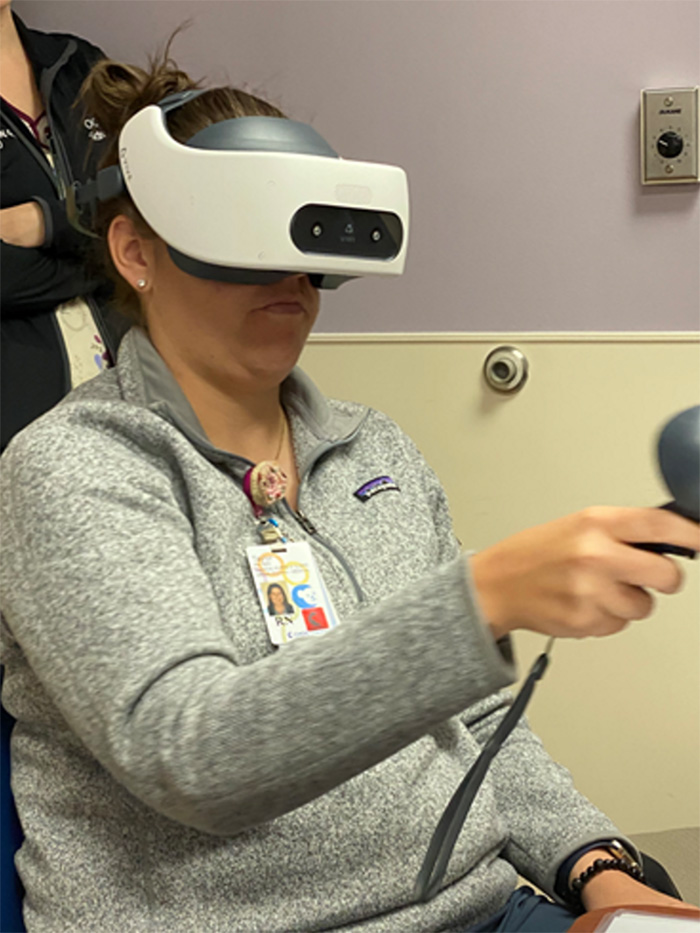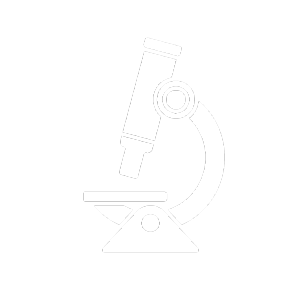You’re in the Alps watching the sun rise.
Golden light kisses the snow-capped peaks.
The day progresses to evening, and you watch the moon rise and set.
And all the while, you’re listening to the soothing “Morning Mood” from Peer Gynt Suite No. 1, Op. 46 by Edvard Grieg.
For almost four minutes, while wearing a virtual reality (VR) headset, scores of CHOC nurses and other healthcare workers experienced this idyllic world voluntarily while on their breaks as participants in a novel study whose results recently were published.
The study, conceived of and conducted by CHOC Nursing Research and Innovation, in collaboration with Maestro Games SPC, concluded that participants reported a “significant” decrease in burnout after three sessions of the immersive classical music VR experience.
“I definitely felt a sense of well-being and being able to move ahead and complete my day,” says Susan See, nurse manager of the neuroscience unit and the multispecialty unit and one of the co-authors of the study, published in The Journal of Nursing Administration in May 2022.

“I loved it,” Susan further comments. “It was a complete diversion.”
Even before the COVID-19 pandemic began in March 2020, CHOC nurse leaders like Susan were looking at ways to address compassion fatigue and burnout.
“The pandemic multiplied it exponentially,” Susan says. “We see tough things every day. That’s the norm for us, but it’s not normal.”
The timing was perfectly aligned for the study, “Effects of Classical Music Virtual Reality on Pediatric Healthcare Worker Compassion Fatigue,” whose lead author is Jennifer Hayakawa, DNP, CHOC’s manager of Nursing Research and Innovation. The other two co-authors are John Schomberg, PhD, a biostatistician in CHOC’s department of nursing, and nurse scientist Jennifer Barrows, PhD.
Hayakawa got the idea of launching the study after spending time beta-testing the VR experience “The Last Maestro®” created by Maestro Games, SPC, a Los Angeles-based social purpose company. Maestro Games’ mission is to provide a non-pharmaceutical alternative to build and maintain mental resiliency for first responders, military, healthcare personnel and their families who are susceptible to post-traumatic stress, moral injury, depression, substance abuse, and other forms of distress because of the demands placed on them.
Maestro Games was founded by Yael Swerdlow, a long-time photojournalist who has covered civil unrest, natural disasters, gang violence, as well as the aftermath of genocide, famine and war. She now suffers from PTSD, moral injury, and anxiety because of these assignments.
Impact on healthcare provider burnout
“When a nurse or healthcare worker is stressed or burned out, you will see it in the care they provide,” Susan says. “Burnout may interfere with health care workers’ ability to develop caring relationships, negatively impacting patient outcomes.”
So, improving the mental health of healthcare workers is critical in achieving the best patient outcomes.
As the study put it, “Nurses must first care for themselves before being able to provide compassionate care to others.”
Says Hayakawa: “With the increasing burden of the COVID-19 pandemic on mental health, it’s imperative that healthcare workers have tools to manage their stress and to mitigate the psychological impact of providing compassionate care. We need to think outside of the box to find safe and affordable strategies to reduce burnout and secondary traumatic stress in healthcare workers.”
‘The Last Maestro’ VR system
In the study, a total of 71 CHOC healthcare workers – 83% of them nurses, more than half of them from the neonatal intensive care unit (NICU) – completed all three VR sessions.
Each participant underwent one session per week during a five-week period, donning Oculus Rift or VIVE Focus headsets to disengage for five minutes while experiencing “The Last Maestro.”
In addition to reporting significantly less burnout after the sessions, participants also felt lower levels of stress, anxiety, caring ability and “compassion satisfaction” when a more simplified method of analysis was used, states Schomberg. “When we set the bar a little bit higher,” he explains, “the one to hold up was burnout. The strongest association was definitely with that.”
Schomberg believes this is the first study of its kind in which VR has been used for this desired outcome.
“In that way,” he says, “the study is novel.”
Additional VR projects at CHOC
Another VR-related study using “The Last Maestro” is planned for CHOC’s Mental Health Inpatient Center (MHIC).
Augmented reality was used to improve patient care for kids undergoing MRIs in the recently launched “MRI With Choco.”
In yet another study to address the issue of the mental well-being of healthcare workers, the Nursing Research and Innovation team partnered with Ruth McCarty, DACM, LAc and the CHOC Emergency Department to evaluate the effect of auricular acupuncture or acupressure as compared with ear massage on anxiety, burnout, and caring capacity.
A total of 117 (36%) of 325 eligible participants consented to participate in the study. Seed acupressure treatment was associated with a reduction in burnout and secondary traumatic stress. This study, supported by One Wish Grants, a program presented by the CHOC Foundation and its board of directors, was published in Journal of Trauma Nursing earlier this year.
CHOC first to use system
Meanwhile, Yael Swerdlow, CEO of Maestro Games SPC, says CHOC will be the first of several planned pediatric healthcare systems to formally launch The Last Maestro® VR experience on VIVE Focus 3 headsets. U.S. technology giant Dell Technologies, a strategic partner of Maestro Games, is providing the headsets and Maestro Games the software in a Dell Technologies-funded 60-day trial program.
Swerdlow further states that her company plans to expand the technology to address violence in the healthcare setting, which tragically has made recent headlines with a shooting in Oklahoma and a multiple stabbing in Encino. That effort is a partnership between Maestro Games, Dell Technologies, and MILO, a leading provider of interactive simulation training.
“I’m incredibly grateful for CHOC and Jennifer Hayakawa for having the vision and the foresight of realizing the power that ‘The Last Maestro’ has to deal with healthcare provider burnout and anxiety and PTSD as it unfortunately increases and becomes more of a crisis,” concludes Swerdlow.

Learn about pediatric research and clinical trials at CHOC




